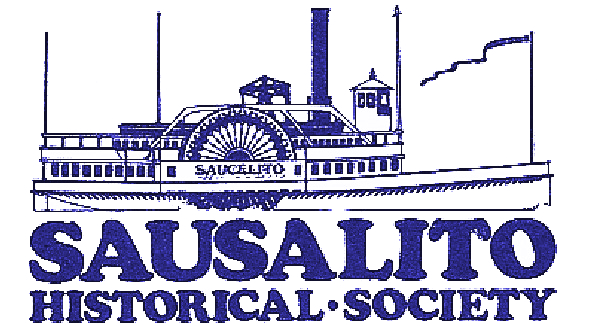By Annie Sutter
The following is excerpted from an 1885 interview of Jim Wyatt by the Historical Society’s Annie Sutter:
“They called us the Hill Skunks and we called them the Water Rats, and we always threatened to have a gang fight on Halloween – but it never happened,” recalls Jim Wyatt who was born at his family home on Sausalito Blvd., right in the heart of “Hill Skunk” territory. Jim’s parents built their house here in 1900, and Jim, the middle of five kids, was born on Sausalito Blvd. in 1907. . . “there was no hospital in the whole county, dear,” he says, and adds, “I grew up in that house. It had eighteen rooms, a tennis court and a big yard. We had a gardener, and servants who lived in, first French girls, then Chinese. There were only a few houses on the Hill then, and only two on Sausalito Blvd. The streets weren’t paved, and there was a big tank wagon that would spray to keep the dust down. Life was entirely different then – there were no cars – and we walked, rain or shine. I think you got a lot closer to people in those days…”
What was life like for a kid growing up in the wilds of Sausalito Blvd. In the first years of the 20th century?
“Sausalito – oh, early Sausalito was an entirely different society. The people of the Hill were white collar workers who went to the City to work, and downtown people worked on railroads or ferries or in stores. We commuted on the ferries – the Eureka, Cazadero and the Tamalpais – and round trip commuters tickets were 25 cents. It was sort of like a party – you knew everybody on the boat. The men all sat together downstairs, and the ladies went up to what we called the “Perfume Deck.” There was lots of card playing – no, not dealers or anything, just guys playing cards together.
“There were no automobiles; each store where would deliver your order. Frank Perara from Fiedler’s Grocery would come by every morning and take your order and it would be delivered in the afternoon in a horse-drawn two-wheeled cart. Milk came in an open bucket by horse and buggy. Ice? Oh yes, Mr. Mason had the ice house. He delivered on a two-horse wagon. He’d cut up 100-lb. blocks; you could get 20-lb. or 50-lb. and he’d take it up to the house and put it in your ice box. Oh, maybe a couple of times a week, depending on the weather.
“For vegetables, you called Ratto and Mecchi. The telephone was on the wall; you had to wind it up. Everyone knew the operator by name – ‘Mable?’ you’d say, ‘I’m going over to so-and-so’s; send my calls over there…’ And you know everybody in the stores. At the candy store, kids could get an ice cream for free if they knew you.
“Manuel Perara had the taxi, a two-horse wagon with seats on the side. You walked down the hill in the morning, but you got off the ferry and onto the wagon for the trip up. Oh, we kids’d snitch a ride on the delivery carts if we could, and you could roll your bike down the hill, but it was pretty hard going up.
Newspapers were brought from the City in the early morning by Old Man Lange on his launch – he always wore a derby hat and a suit of clothes, and he’d go over and get the papers and distribute them here. My father bought one every morning at the ferry dock and read it while he rode across to the City.
“Fire – we had a horse drawn engine. Usually the horses were out working for the City by day and so if you had a fire by day…well…by the time they got the horses and got them hitched up, it was pretty bad. Oh, and they had those little hose cart shacks stationed up around the hill, two-wheel carts with a hose wrapped around a drum and a place for a man to sit and brake. Well, they were stationed at the top, so you were always going down. It was too much of a job to pull them up. They’d hitch them up to fire hydrant closest to the fire. The Fire Department was across from where Horizons Restaurant [today’s Trident] is now, and the jail was alongside that building. There were two cells, and if there was anybody in jail, we kids would go and look at them. But there weren’t many – the biggest sin? Drunkenness.
There were no policemen. If you got into trouble, you called Mr. Ashoff, a baker who was open all night, over on Caledonia. He rode around on a bike. Now, if you had any trouble on the Hill, he couldn’t get to you. But nobody ever called him. Any trouble there was – it was downtown in the saloons. When I was a kid, pretty near every place was a saloon – with a Chinese gambling joint upstairs. No, our parents didn’t forbid us to go – we couldn’t get in! The doors had big brass plates saying no minors allowed.
